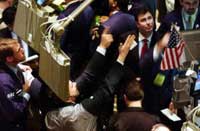U.S. stock futures move slightly lower ahead of employment report
U.S. stock futures revealed little early Friday as investors held off making bets until the government's February job report arrives an hour before the opening bell.

The report has been by far the most anticipated economic data all week because Wall Street is particularly eager after last week's pullback in global markets to get a read on the strength of the economy. Investors sent shares sharply lower last week amid unease about the global economy as well as concern that a rising yen would put a chokehold on worldwide liquidity. The declines sent the major indexes lower for the year.
A day after Wall Street rose following several sessions of more stable trading, Dow Jones industrial futures fell 6 points, or 0.89 percent. Nasdaq 100 index futures fell 2.0 points, or 1.5 percent, while Standard & Poor's 500 index futures fell 2.30 points, or 0.93 percent.
The Labor Department report could have implications for interest rates. The Federal Reserve remains vigilant about inflation, especially an increase wage costs in a tight labor market. Job growth has slowed from last year and a weak reading could help convince the Fed that a reduction in short-term interest rates is in order. The central bank has left rates unchanged at its last five meetings after raising rates 17 straight times since 2004.
The employment figures, which give a read on average hourly earnings, follow a four-month high in the unemployment rate in January.
It remains unclear whether cold and wintery weather across much of the country in February hurt employment. Construction jobs, for example, can be sidelined in such conditions.
Beyond the employment report, figures on the U.S. trade deficit for January are due Friday.
The afternoon brings speeches from Fed Gov. Susan Bies as well as Fed Vice Chairman Donald Kohn and Richmond Fed President Jeffrey Lacker. Fed Governor Randall Kroszner and Minneapolis Fed President Gary Stern are also expected to speak Friday.
The anticipation over the employment data comes as overseas markets, which have held more-than-normal sway over U.S. markets in recent weeks, were mixed.
Japan's Nikkei stock average closed up 0.43 percent, while Hong Kong's Hang Sang index fell 0.34 percent and the sometimes volatile Shanghai Composite Index, whose precipitous fall Feb. 27 helped kick off the worldwide selloff, rose 0.34 percent. Stocks fell in Europe.
In currency, the dollar rose, trading at about 117.35 yen Friday morning. Following the drop in markets last week, concerns about a rising yen stirred unease about the possible erosion of the so-called yen carry trade, in which investors borrow the inexpensive yen to acquire assets in other currencies that carry greater yields. Investors are concerned a slowdown could hurt worldwide liquidity, reports AP.
Subprime lenders, which makes loans to people with poor credit, could again weigh on investors' minds Friday after New Century Financial Corp. said in a Securities and Exchange Commission filing that it halted all new loan applications as it has faced difficulty obtaining financing amid market speculation that a bankruptcy filing was possible.
Subscribe to Pravda.Ru Telegram channel, Facebook, RSS!

